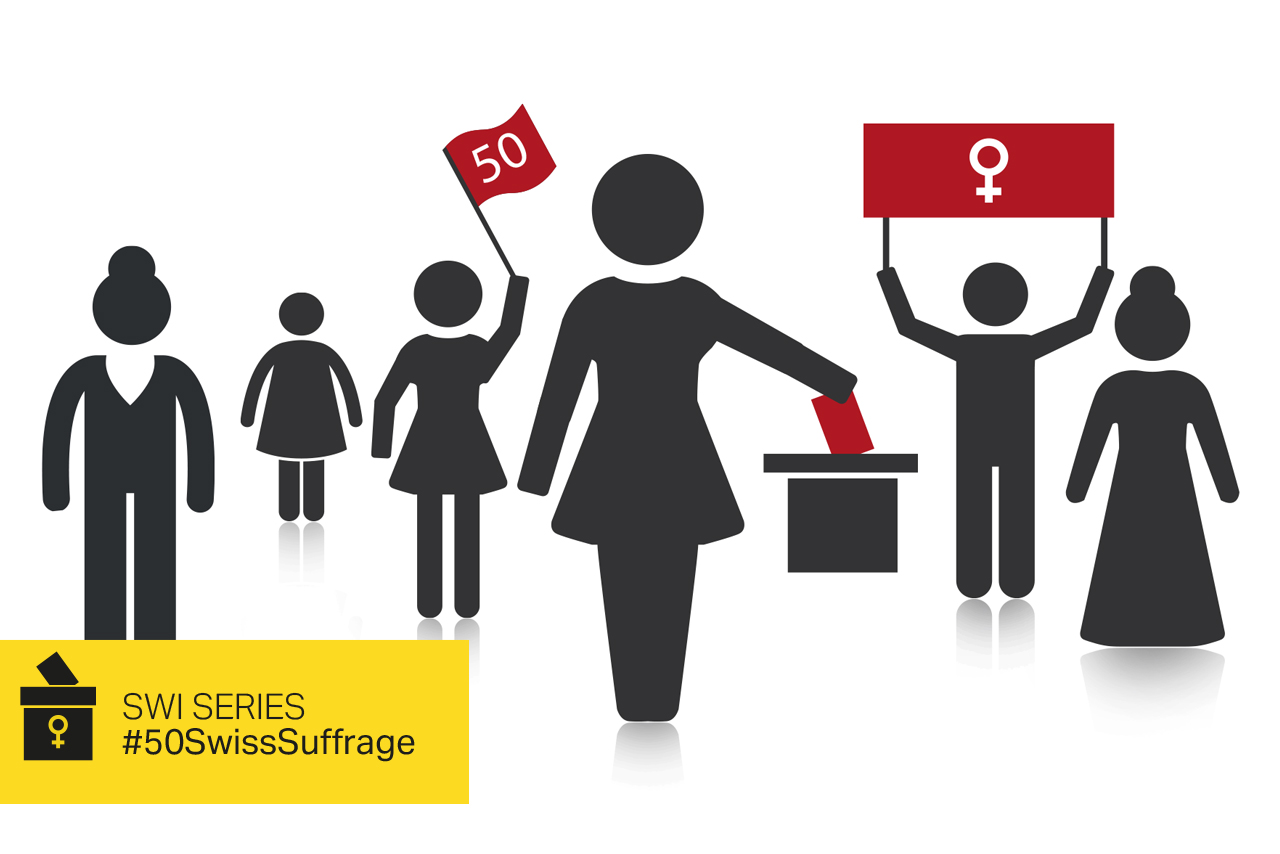To advance gender equality in Switzerland, remove family status from CVs
Today Switzerland is celebrating the 50th anniversary of women’s right to vote. Many Swiss women are using this anniversary to remind the country of how very far the Alpine nation has yet to travel to make gender equality a reality.
There is so much work to be done. Switzerland ranks 26 (of 29) in The Economist’s 2020 glass ceiling indexExternal link, between Greece and Turkey and only slightly higher than Japan and South Korea. Women make up only 10% of the executive boards of the 100 largest Swiss employersExternal link; slightly more than half of these companies have any women at all on their executive boards.
Alexandra Dufresne teaches US law, international law, and children’s rights at institutions of higher learning in Switzerland. She works with refugee, human rights and development NGOs in Europe and is a co-founder of ‘Action Together: Zürich, CH’, an action group of US citizens in Switzerland.
The Covid-19 crisis has made gender inequality worseExternal link around the world. As frequently happens in crises, women are the last to be hired, and the first to be fired.
Advocates have made many excellent suggestions for initiatives that could improve gender equality in Switzerland. I would like to add to the mix a relatively modest proposal; what people in policy circles refer to as “low-hanging fruit”. That is to simply stop including marital and parenthood status on CVs.
In written job announcements, employers should specify that CVs with family or parent status will not be processed. Job counselling services, whether private or public, should be clear that family status has no place on a CV, with very narrow exceptions (described below).
The status quo: a unwritten rule
Readers outside of Switzerland might be puzzled as to why this conversation is necessary. Including marital or parenthood status on one’s resume in many Western industrialized countries, including the United States., would send one’s job application straight to the recycling bin. In the US, as in many other countries, it is strictly forbidden for employers to ask job candidates about family status.

More
The introduction of women’s suffrage worldwide
Yet including marital and family status is an “unwritten rule” in Switzerland for many job applicants. When I moved to Switzerland in 2016, I was advised to put the birth dates of my children on my CV. The template provided by Manpower in Switzerland includes family statusExternal link. Several women I know have been advised by job counsellors to include their children on their CVs, along with a note that they have arranged for childcare. Some mothers of young children even note on their CVsExternal link that they do not plan to have more children. Others report that they were advised that this information is “optional.” (The University of Zurich’s career counselling web page describes this information as optionaExternal linkl). Although this norm is not absolute, it is prevalent enough to be studied in academic researchExternal link regarding gender discrimination in the labour market.
Why is this “unwritten rule” harmful?
Marital and parenthood status are not relevant to job performance. However, this information is used to discriminate against mothers or married women of child-bearing age, whether consciously or unconsciously. For example, in a 2019 academic paperExternal link discussing the results of a large-scale field experiment in Switzerland, Germany and Austria, Sasha Becker, Ana Fernandes and Doris Weichselbaumer found “presence of substantial hiring discrimination based on realized and expected fertility for part-time jobs”. This is bad news for women in Switzerland, as the majority of women who work in Switzerland work part-time. In contrast, with respect to men, the authors note: “[T]here is no discernible pattern for men neither for full-time nor part-time jobs… i.e. firms do not seem to consider information on a male applicant’s family important enough to make use of it for their hiring decisions.”
Some will argue that employers can find out family status information anyway. Yes, of course: a human resources department with time on its hands can do some internet sleuthing to try to figure out if an applicant is a mother. But this takes energy, time, and deliberate intent, and this information is often hard to find. It is certainly not on one’s LinkedIn page.

More
How the women of Unterbäch claimed the vote
Others argue that employers will discriminate against women regardless, and that this at least gives women the opportunity to impress upon their would-be employers their childcare arrangements. It is likely that people will discriminate anyway. However, the goal is to make discrimination more difficult: to shift the default to equality. This modest change is intended to enable more women to make it past the first cut in the hiring process; to make it to the interview stage, where they will have the opportunity to demonstrate their skills and strengths.
It is often argued that this information is simply used as “background”, as employers like “personal information” so that they can get to know the applicant and get a sense of whether the applicant is “a good fit.” What if the employer – for example, in a small family business – sincerely wants to know “who the applicant is”?
First, this type of language – however innocently intended – raises concerns about equity, as it has historically often been used to justify subtle, unspoken, or “between the lines” types of discrimination. People tend to think of “a good fit” in terms of what makes them “feel comfortable” and what makes them feel comfortable is what they are accustomed to. Not until sufficient numbers of women in Switzerland are in positions of authority will our perceptions of who is “a good fit” for which types of job change.

More
The power of voting: still not a matter of course
Second, it is possible to evaluate a good fit from interviewing, reference checks, reviewing samples of earlier work and even a well-designed performance test during the interview. The existence of family responsibilities is not going to convey relevant information. Or, if the information is minimally relevant, the prejudicial value (“She has a husband and kids so this job is probably just extra for her”) is likely to outweigh the probative value (“She has children so she will fit in well with the other parents here.”)
A narrow exception
Some sectors of the economy are going “the extra mile” to ensure gender equality. For example, government grants for academic research often ask for family or caretaking status information. However, this information is used to help level the playing field for female researchers and academics who take “time off” for maternity leave or to care for young children. Asking for family status information in this context is fine.
For other employers, however, there is no need to continue the practice of including family status on one’s resume just because it is “the way things are done.” After all, 50 years and one day ago, women in Switzerland did not have the right to vote, as that was just the way things were done.
Change requires employers to state explicitly that family status information is unwanted.
It is important for employers to affirmatively state in their hiring materials that they will not process CVs with family status information. Otherwise, women with spouses and children will continue to feel pressure to include this information in order to comply with social norms. Similarly, single women and women without children might be tempted to include this information on their CVs, so that they have an advantage vis-a-vis other women. This decision might be “rational” for them as individuals in the short-term, but is harmful to women as a whole and harmful to their future selves if they one day decide to have children.
By taking affirmative steps to abolish this outdated norm, Switzerland would signal to its labour market – much of which is international – that it is serious about making progress on gender equality. It will signal to people of all genders that the best “fit” for a job is based on one’s personal skills, training and abilities – one’s creativity, flexibility, kindness, ambition, resilience, determination – not one’s gender.
The views expressed in this article are solely those of the author, and do not necessarily reflect the views of swissinfo.ch.
Opinion series
swissinfo.ch publishes op-ed articles by contributors writing on a wide range of topics – Swiss issues or those that impact Switzerland. The selection of articles presents a diversity of opinions designed to enrich the debate on the issues discussed. If you would like to submit an idea for an opinion piece, please e-mail english@swissinfo.ch

In compliance with the JTI standards
More: SWI swissinfo.ch certified by the Journalism Trust Initiative











